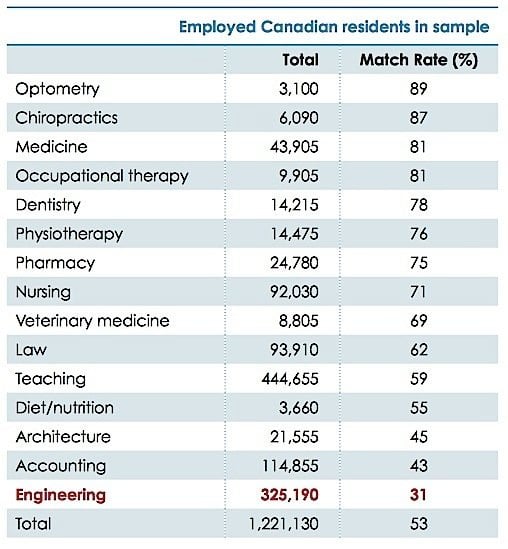The Ontario Society of Professional Engineers (OSPE) says that too many engineering graduates are underemployed, i.e., working in jobs that don’t necessarily require a university degree. The engineers group had previously reported on what it called a “disconnect” between employers’ claims of a shortage of workers, and the claims of qualified engineers who said they could not find work. OSPE has also investigated the “misalignments” between the recruiting processes of employers and the job search practices of internationally trained engineers.
The new report, Crisis in Ontario’s Engineering Labour Market; Underemployment Among Ontario’s Engineering-Degree Holders, reveals a “grim reality” in the engineering profession. It finds that while younger graduates (aged 25–34 years) are more likely to find work as engineers or engineering managers than are older workers, especially those aged 45–54 years, just 29.7 per cent of those with engineering degrees actually work as engineers, based on 2011 data. For those trained outside of Canada, the situation is worse. Just over 20 per cent of internationally trained engineers who came to Canada have been able to find work as engineers here. The situation is also worse for women: 50 per cent of women trained as engineers outside Canada were unemployed. Women engineers must face the additional insult of earning from 15 to 23 per cent less money for doing the same work as male counterparts.
Compared to fourteen other regulated professions, engineering had the lowest match rate in 2006; just 31 per cent of trained engineers had jobs that matched their qualifications. This compared to 89 per cent among optometrists, the profession with the highest match rate of all.

Looking at the data “at face value,” the engineering group finds that having so many engineering graduates not working as engineers, or even in jobs that require a university degree, is too high. “Further, we believe it is indicative of serious underemployment that needs to be addressed and alleviated.”
No matter what term is used—skills shortage, labour shortage, skills mismatch, or underemployment—the issue is the same. Having university-educated individuals working in jobs that don’t necessarily require a degree behooves all stakeholders to step-up and tackle the problem.
OSPE
From the unusually low match rate between graduates and work, OSPE makes several inferences. One is that engineering graduates face a more difficult time qualifying for jobs in their field. Another is that there are more engineers than there are jobs. A third is that engineers willingly chose to leave the profession to work elsewhere, though statistics show that those who do so earn “substantially less” than those who work in engineering.
The OSPE report explores a number of key questions to attempt to understand this crisis that faces it. Are we graduating too many engineers in Canada. Are the universities doing a good enough job in educating them? Are employers doing their part to provide entry-level positions and provide in-house training for newly graduated engineers?
In looking for solutions, OSPE notes that a lack of reliable data is one problem hampering its efforts. It wants to see the government reinstate the long-form census so that better labour market information will be available. It also calls on universities and industry to ensure that their classroom programs and on-the-job training are better matched to the real world. More co-op training programs and programs that increase innovation are also called for.


































